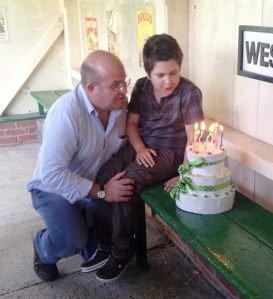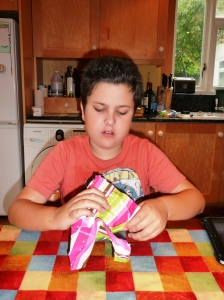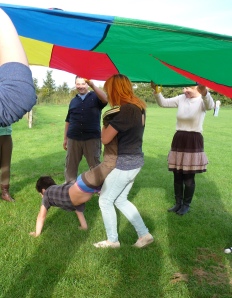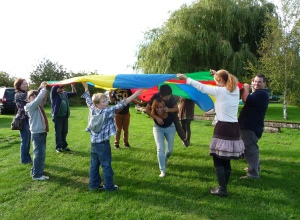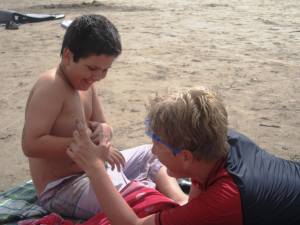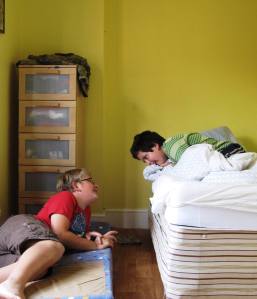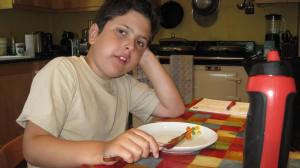Henry brings me the iPad to show me a thumbnail photo of his brother watching television.”TV, TV” he says. I’m busy in the kitchen and say “Yes, Ned watching TV” in speech-therapy-approved-extending-the-phrase style but this isn’t what he wants. What he is pointing at in the photo, increasingly insistently, is a miniscule rectangle of green balanced on the top of a heap of similar tiny rectangles piled on the table beneath the TV. Helpfully, he grabs the iPad back, selects the photo, enlarges it with finger and thumb and shoves it under my nose again. If I squint, I can just about make out a video. Rosie and Jim:Trees. Of course, this, according to the Law of Things One is Asked When in the Middle of Cooking Dinner, is the one video that is no longer in the pile. We have Rosie and Jim:Puppets, Rosie and Jim:Hats and Rosie and Jim:Gingerbread Man, but none of these will do. I spend many, many minutes looking behind sofas and under beds and many, many more trying to explain that Rosie and Jim:Trees has disappeared, is gone, lost, not here, while Henry grows increasingly frustrated. It’s in the photo, therefore it should be here.
Despite the hair-tearing, this incident got me thinking about Henry’s use of IT and my thoughts were further stretched by a post entitled ‘The IT Kid’ on the blog ‘Life with an Autistic Son’ (http://autisticson.wordpress.com) in which the writer, ‘B’s Dad’, discusses his son’s obsession with computers. I hope he won’t mind me taking the theme and running with it for a while. Although our sons are at the opposite ends of the spectrum, much of what he writes hits me with a thud of recognition.
Henry adores his iPad. It is the first thing he asks for in the morning and he would happily use it all day if we let him. Before the iPad, it was our PC and before that, a portable DVD player, but neither had the ease of use and sense of control that the iPad seems to provide. He doesn’t play games, but has built up a vast library of bookmarked Youtube clips around which he scoots with dizzying speed. Each clip brings up a menu of alternative links, and he is able to navigate between these, sometimes jumping between six or seven screens before finally arriving at the clip he wants. There must be part of his brain that resembles a London Underground map, telling him that to get to Truly Scrumptious he has to travel via Trumpton and Tots TV, changing at Toyland and Fun Song Factory and finally alighting at Chitty Chitty Bang Bang. Each clip is also studied in minute detail, so that he knows exactly where to move the play bar in order to get to the moment when Thomas sneezes or the judge tells Toad he is sentenced to ‘another year for being green’. He’s also interested in the photo library, though not to anything like the same extent, tending to focus on pictures of himself eating chips and the aforementioned TV photo, but other than that, it’s YouTube all the way.
We have rules for iPad use – he only has it during the school day at lunchtime and isn’t allowed it after dinner in the evening. We’ve also introduced ‘iPad sharing time’ in the morning, whereby he engages with a speech therapy, colours or drawing app in return for a turn on YouTube, which we then watch with him. But there are still a huge number of hours a week when he’s glued to a screen. Like many parents, this makes me feel guilty, but there is perhaps more anxiety attached to the issue when you have a child with autism and speech delay, and particularly one who responds so well to therapies like Intensive Interaction. Every minute that he spends communing with YouTube is one less minute spent interacting with another person, one less minute learning about two-way communication, one less minute exploring the real world (and who am I kidding typing ‘minute’ when I mean ‘hour’?). Another worry is the fact that iPad use seems to increase stims, in particular a repeated, drawn out ‘ Eee-eeee’ sound which, not to put too fine a point on it, just makes him sound more autistic.
And yet and yet – it’s the only thing he can do independently with any degree of skill. His fine motor skills, so delayed in other areas, are precise and delicate when he’s navigating on screen. Listening closely to the clips he chooses reminds me of something I’ve always known – that he loves the sounds and rhythms of words as much as music – and that is something we can use in II sessions. It gives us time to do other, necessary, domestic stuff. It saves the TV remote from imploding. Apart from the fact that he still favours CBeebies and Hit Factory, his skills are more age=appropriate than in any other area of his life. And above all, what his use of the iPad demonstrates is his enjoyment of having something he can control, absolutely and completely, in a world where not much else is easily controlled.
Of course we’ve considered cashing in on Ipad-love to try using the device as a communication aid, but Henry absolutely refuses to have anything to do with Proloquo2Go or any of the other talker apps we’ve tried. It’s the old story – anything he wants, he learns to say or finds a way to show us, as the ‘Rosie and Jim’ incident demonstrates. It’s not something we’ve ruled out though and although we’re following the speech therapist’s advice to concentrate on developing his spoken language at the moment, it’s something we’ll revisit. Unfortunately, I think we’ll need another device – one without Youtube!
![1476196_781442341881611_1912187198_n[1]](https://movingbeyondthelabel.files.wordpress.com/2013/12/1476196_781442341881611_1912187198_n1.jpg?w=225&h=300)
![1452234_781458388546673_590650290_n[1]](https://movingbeyondthelabel.files.wordpress.com/2013/12/1452234_781458388546673_590650290_n1.jpg?w=225&h=300)


